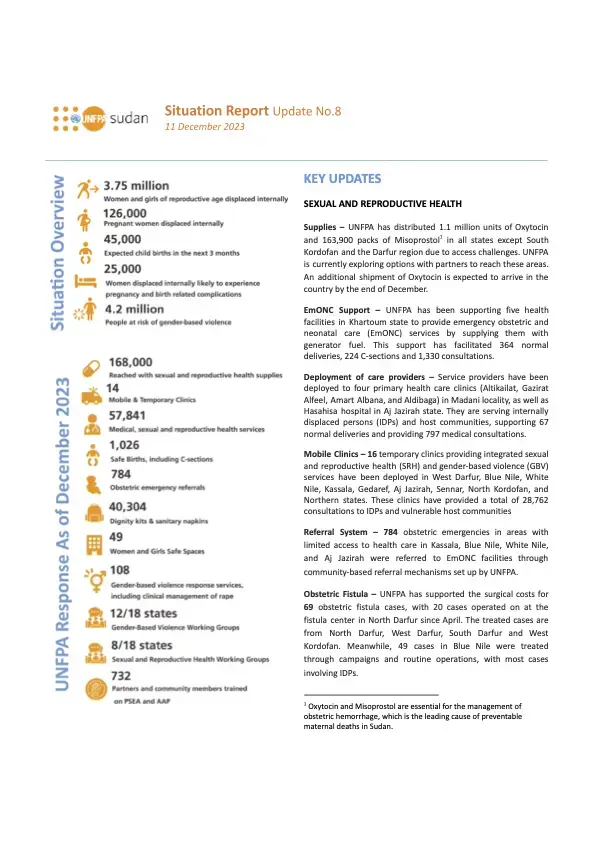Sudan Emergency: Key Updates on UNFPA’s Response
As the humanitarian crisis in Sudan escalates, UNFPA continues to prioritize the provision of life-saving sexual and reproductive health (SRH) services and gender-based violence (GBV) prevention and response interventions. Despite ongoing challenges, including security risks, limited access, and logistical constraints, UNFPA has made significant strides in reaching vulnerable populations, particularly women and girls affected by the conflict.
Sexual and Reproductive Health
UNFPA has distributed over 1.1 million units of Oxytocin and 163,900 packs of Misoprostol to most states, with efforts underway to reach South Kordofan and the Darfur region. In Khartoum, five health facilities have been supported with fuel to power generators, facilitating more than 364 normal deliveries, 224 C-sections, and over 1,300 consultations. Mobile clinics have been deployed to various states, providing over 28,000 consultations to internally displaced persons (IDPs) and host communities. UNFPA is also addressing obstetric emergencies, with 784 cases referred to emergency obstetric and neonatal care (EmONC) facilities in key states.
In addition, UNFPA has supported the treatment of 69 obstetric fistula cases, with 20 surgeries performed in North Darfur since April. Rehabilitation efforts are ongoing, including the installation of solar-powered electric systems in two hospitals, ensuring the smooth operation of critical departments. Capacity-building initiatives have trained over 100 healthcare providers on clinical management of rape (CMR) and SRH services.
Gender-Based Violence (GBV) Prevention and Response
UNFPA continues to expand its GBV response, distributing dignity kits to over 3,000 women and girls in West Darfur and providing critical awareness on GBV, menstrual hygiene management, and referral systems. Nine new Women and Girls Safe Spaces have been established to offer psychosocial support and case management, while 4,520 community members were reached with GBV awareness-raising activities.
In partnership with local organizations, UNFPA has trained over 870 social workers, healthcare providers, and community leaders on GBV risk mitigation, response, and harmful practices like female genital mutilation and child marriage. Two new community-based protection networks were established to support affected populations in Aj Jazirah and White Nile, while additional training sessions have enhanced capacity building for remote GBV service provision.
Coordination and Capacity Building
UNFPA is leading GBV coordination across 14 states, working through established GBV Working Groups to ensure access to life-saving GBV services. Since April, 74,521 people, including GBV survivors, have been reached with medical, psychosocial, and legal support. Additionally, GBV referral pathways have been updated, and technical guidance has been provided to ensure the safe and effective implementation of services during the conflict.
Challenges and the Way Forward
Access to essential SRH and GBV services remains a significant challenge due to security risks, electricity shortages, and limited clean water. Disease outbreaks such as acute watery diarrhea and malaria pose additional threats to pregnant women, while economic hardship continues to exacerbate GBV vulnerability. UNFPA is working to overcome these challenges by strengthening community-based referral systems, deploying mobile health teams, and ensuring that women and girls receive the protection and care they need during this ongoing crisis.
Despite the obstacles, UNFPA remains committed to addressing the urgent needs of displaced populations in Sudan, ensuring that life-saving SRH and GBV services reach those most in need.


